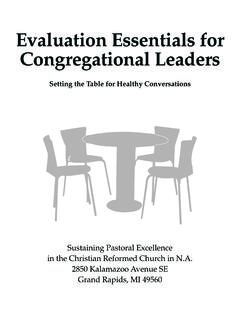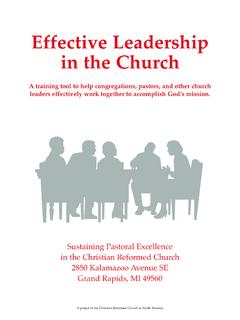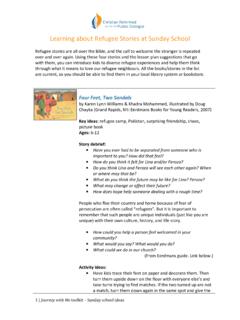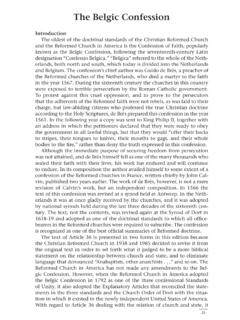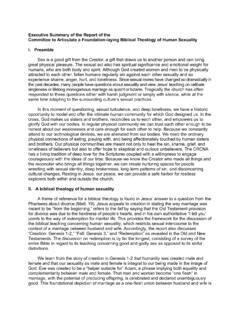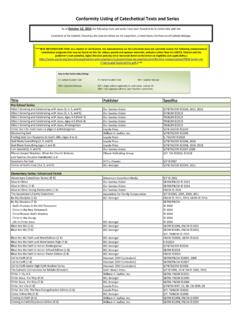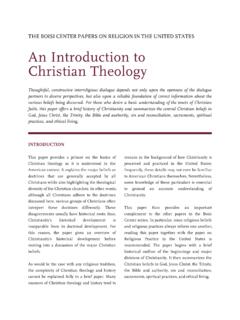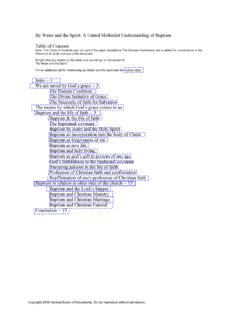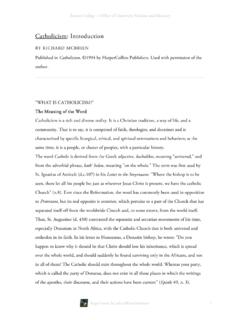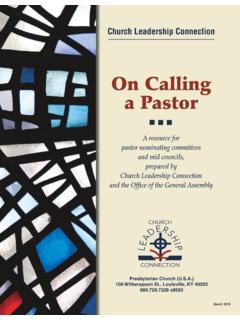Transcription of The Heidelberg Catechism - Christian Reformed Church
1 69 The Heidelberg CatechismIntroductionThe Heidelberg Catechism (1563) was composed in the city of Heidelberg , Germany, at the request of Elector Frederick III, who ruled the province of the Palatinate from 1559 to 1576. The new Catechism was intended as a tool for teaching young people, a guide for preaching in the provincial churches, and a form of confessional unity among the several Protestant factions in the Palatinate. An old tradition credits Zacharias Ursinus and Caspar Olevia-nus with being the coauthors of the Catechism , but the project was actually the work of a team of ministers and university theologians under the watch-ful eye of Frederick himself. Ursinus probably served as the primary writer on the team, and Olevianus had a lesser role.
2 The Catechism was approved by a synod in Heidelberg in January 1563. A second and third German edi-tion, each with small additions, as well as a Latin translation were published the same year in Heidelberg . The third edition was included in the Palati-nate Church Order of November 15, 1563, at which time the Catechism was divided into fifty-two sections or Lord s Days, so that one Lord s Day could be explained in an afternoon worship service each Sunday of the Synod of Dort approved the Heidelberg Catechism in 1619, and it soon became the most ecumenical of the Reformed catechisms and confes-sions. It has been translated into many European, Asian, and African lan-guages and is still the most widely used and warmly praised Catechism of the Reformation of the footnoted biblical references in this translation of the cate-chism were included in the early German and Latin editions, but the precise selection was approved by Synod 1975 of the Christian Reformed S DAY 11 Q.
3 What is your only comfort in life and in death? A. That I am not my own,1 but belong body and soul, in life and in death 2 to my faithful Savior, Jesus He has fully paid for all my sins with his precious blood,4 and has set me free from the tyranny of the He also watches over me in such a way6 that not a hair can fall from my head without the will of my Father in heaven;7 in fact, all things must work together for my Because I belong to him, Christ, by his Holy Spirit, assures me of eternal life9 and makes me wholeheartedly willing and ready from now on to live for 1 Cor. 6:19-202 Rom. 14:7-93 1 Cor. 3:23; Titus 2:144 1 Pet. 1:18-19; 1 John 1:7-9; 2:25 John 8:34-36; Heb. 2:14-15; 1 John 3:1-116 John 6:39-40; 10:27-30; 2 Thess.
4 3:3; 1 Pet. 1:57 Matt. 10:29-31; Luke 21:16-188 Rom. 8:289 Rom. 8:15-16; 2 Cor. 1:21-22; 5:5; Eph. 1:13-1410 Rom. 8:1-172 Q. What must you know to live and die in the joy of this comfort? A. Three things: first, how great my sin and misery are;1 second, how I am set free from all my sins and misery;2 third, how I am to thank God for such Rom. 3:9-10; 1 John 1:102 John 17:3; Acts 4:12; 10:433 Matt. 5:16; Rom. 6:13; Eph. 5:8-10; 2 Tim. 2:15; 1 Pet. 2:9-10 Part I: MiseryLORD S DAY 23 Q. How do you come to know your misery? A. The law of God tells Rom. 3:20; 7:7-254 Q. What does God s law require of us? A. Christ teaches us this in summary in Matthew 22:37-40: You shall love the Lord your God with all your heart, and with all your soul, and with all your mind.
5 1 This is the greatest and first commandment. And a second is like it: You shall love your neighbor as yourself. 271 On these two commandments hang all the law and the prophets. 1 Deut. 6:52 Lev. 19:185 Q. Can you live up to all this perfectly? A. I have a natural tendency to hate God and my Rom. 3:9-20, 23; 1 John 1:8, 102 Gen. 6:5; Jer. 17:9; Rom. 7:23-24; 8:7; Eph. 2:1-3; Titus 3:3 LORD S DAY 36 Q. Did God create people so wicked and perverse? A. No. God created them good1 and in his own image,2 that is, in true righteousness and holiness,3 so that they might truly know God their creator,4 love him with all their heart, and live with God in eternal happiness, to praise and glorify Gen.
6 1:312 Gen. 1:26-273 Eph. 4:244 Col. 3:105 Ps. 87 Q. Then where does this corrupt human nature come from? A. The fall and disobedience of our first parents, Adam and Eve, in This fall has so poisoned our nature2 that we are all conceived and born in a sinful Gen. 32 Rom. 5:12, 18-193 Ps. 51:5728 Q. But are we so corrupt that we are totally unable to do any good and inclined toward all evil? A. Yes,1 unless we are born again by the Spirit of Gen. 6:5; 8:21; Job 14:4; Isa. 53:62 John 3:3-5 LORD S DAY 4 9 Q. But doesn t God do us an injustice by requiring in his law what we are unable to do? A. No, God created human beings with the ability to keep the They, however, provoked by the devil,2 in willful disobedience,3 robbed themselves and all their descendants of these Gen.
7 1:31; Eph. 4:242 Gen. 3:13; John 8:443 Gen. 3:64 Rom. 5:12, 18, 1910 Q. Does God permit such disobedience and rebellion to go unpunished? A. Certainly not. God is terribly angry with the sin we are born with as well as the sins we personally commit. As a just judge, God will punish them both now and in eternity,1 having declared: Cursed is everyone who does not observe and obey all the things written in the book of the law. 21 Ex. 34:7; Ps. 5:4-6; Nah. 1:2; Rom. 1:18; Eph. 5:6; Heb. 9:272 Gal. 3:10; Deut. 27:267311 Q. But isn t God also merciful? A. God is certainly merciful,1 but also God s justice demands that sin, committed against his supreme majesty, be punished with the supreme penalty eternal punishment of body and Ex.
8 34:6-7; Ps. 103:8-92 Ex. 34:7; Deut. 7:9-11; Ps. 5:4-6; Heb. 10:30-313 Matt. 25:35-46 Part II: DeliveranceLORD S DAY 512 Q. According to God s righteous judgment we deserve punishment both now and in eternity: how then can we escape this punishment and return to God s favor? A. God requires that his justice be Therefore the claims of this justice must be paid in full, either by ourselves or by Ex. 23:7; Rom. 2:1-112 Isa. 53:11; Rom. 8:3-413 Q. Can we make this payment ourselves? A. Certainly not. Actually, we increase our debt every Matt. 6:12; Rom. 2:4-514 Q. Can another creature any at all pay this debt for us? A. No. To begin with, God will not punish any other creature for what a human is guilty Furthermore, no mere creature can bear the weight of God s eternal wrath against sin and deliver others from Ezek.
9 18:4, 20; Heb. 2:14-182 Ps. 49:7-9; 130:37415 Q. What kind of mediator and deliverer should we look for then? A. One who is a true1 and righteous2 human, yet more powerful than all creatures, that is, one who is also true Rom. 1:3; 1 Cor. 15:21; Heb. 2:172 Isa. 53:9; 2 Cor. 5:21; Heb. 7:263 Isa. 7:14; 9:6; Jer. 23:6; John 1:1 LORD S DAY 6 16 Q. Why must the mediator be a true and righteous human? A. God s justice demands that human nature, which has sinned, must pay for sin;1 but a sinful human could never pay for Rom. 5:12, 15; 1 Cor. 15:21; Heb. 2:14-162 Heb. 7:26-27; 1 Pet. 3:1817 Q. Why must the mediator also be true God? A. So that the mediator, by the power of his divinity, might bear the weight of God s wrath in his humanity and earn for us and restore to us righteousness and 1 Isa.
10 53; John 3:16; 2 Cor. 5:2118 Q. Then who is this mediator true God and at the same time a true and righteous human? A. Our Lord Jesus Christ,1 who was given to us to completely deliver us and make us right with Matt. 1:21-23; Luke 2:11; 1 Tim. 2:52 1 Cor. 1:3019 Q. How do you come to know this? A. The holy gospel tells me. God began to reveal the gospel already in Paradise;1 later God proclaimed it by the holy patriarchs2 and prophets375 and foreshadowed it by the sacrifices and other ceremonies of the law;4 and finally God fulfilled it through his own beloved Gen. 3:152 Gen. 22:18; 49:103 Isa. 53; Jer. 23:5-6; Mic. 7:18-20; Acts 10:43; Heb.

